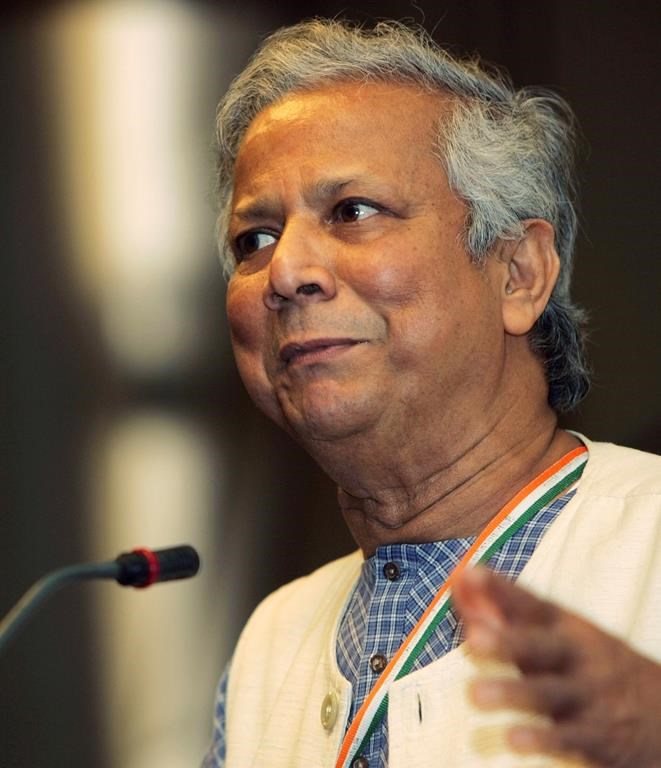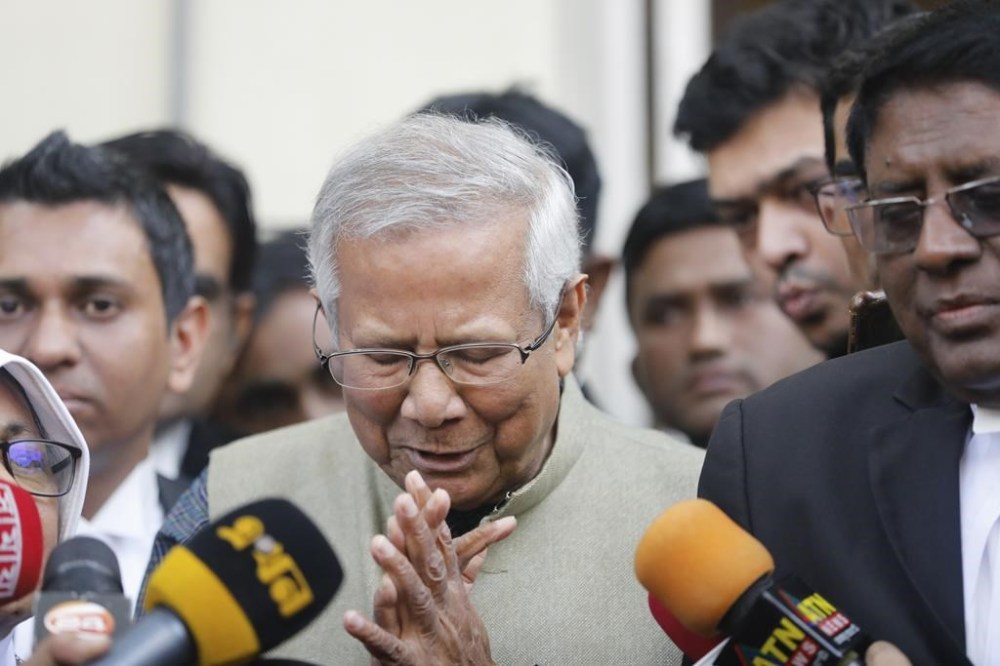Bangladesh appeals court grants bail to Nobel laureate Muhammad Yunus in labor case
Advertisement
Read this article for free:
or
Already have an account? Log in here »
To continue reading, please subscribe:
Monthly Digital Subscription
$1 per week for 24 weeks*
- Enjoy unlimited reading on winnipegfreepress.com
- Read the E-Edition, our digital replica newspaper
- Access News Break, our award-winning app
- Play interactive puzzles
*Billed as $4.00 plus GST every four weeks. After 24 weeks, price increases to the regular rate of $19.00 plus GST every four weeks. Offer available to new and qualified returning subscribers only. Cancel any time.
Monthly Digital Subscription
$4.75/week*
- Enjoy unlimited reading on winnipegfreepress.com
- Read the E-Edition, our digital replica newspaper
- Access News Break, our award-winning app
- Play interactive puzzles
*Billed as $19 plus GST every four weeks. Cancel any time.
To continue reading, please subscribe:
Add Free Press access to your Brandon Sun subscription for only an additional
$1 for the first 4 weeks*
*Your next subscription payment will increase by $1.00 and you will be charged $16.99 plus GST for four weeks. After four weeks, your payment will increase to $23.99 plus GST every four weeks.
Read unlimited articles for free today:
or
Already have an account? Log in here »
Hey there, time traveller!
This article was published 28/01/2024 (628 days ago), so information in it may no longer be current.
DHAKA, Bangladesh (AP) — An appeals court in Bangladesh on Sunday granted bail to Nobel laureate Muhammad Yunus, who had been sentenced earlier to six months in prison for violating the country’s labor laws. The court also agreed to hear an appeal against his sentencing.
Yunus who pioneered the use of microcredit to help impoverished people, especially women, filed the appeal seeking bail on Sunday morning before it was granted. He was awarded the Nobel Peace Prize for his work in 2006.
The 83-year-old economist and three other officials of the telecommunications company were sentenced to six months in prison on Jan. 1, but they were immediately granted 30 days of bail to appeal the verdict and sentence.

Sunday’s court decision said the bail would remain effective until a final decision is made on the appeal for the sentencing.
Defense lawyer Abdullah Al Mamun said the first hearing on the appeal would be held on March 3.
The case involves Grameen Telecom, which Yunus founded as a non-profit organization.
Yunus’ supporters said the case is politically motivated, a charge that the government of Prime Minister Sheikh Hasina, who was elected for a fourth consecutive term earlier this month, has denied.
In the original verdict, the judge said Yunus’ company violated Bangladeshi labor laws. At least 67 Grameen Telecom workers were supposed to be made permanent employees but were not, and a “welfare fund” to support the staff in cases of emergency or special needs was never formed.
The judge also said that according to company policy 5% of Grameen’s dividends were supposed to have been distributed to staff but were not.
The judge found Yunus, the chairman of the company, and the three other company directors guilty, and fined each 30,000 takas, or $260, while also sentencing each to prison.
Yunus said after the original verdict that he was innocent.

“We are being punished for a crime we did not commit. It was my fate, the nation’s fate. We have accepted this verdict, but will appeal this verdict and continue fighting against this sentence,” he told reporters after the verdict was announced on Jan. 1.
Grameen Telecom owns 34.2% of the country’s largest mobile phone company, Grameenphone, a subsidiary of Norway’s telecom giant Telenor.
Yunus is known to have close connections with political elites in the West, especially in the United States, Europe and elsewhere.
He faces a number of other charges involving alleged corruption and embezzlement.
Yunus’ supporters say he has been targeted because of his frosty relations with Hasina.

